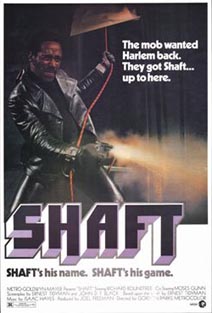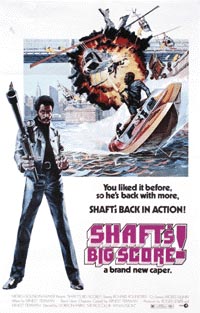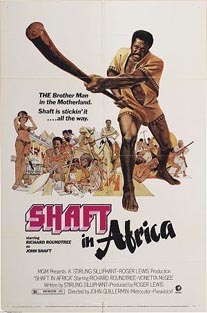
 |
|
Shaft:
|
 |
 |
 |
By
Johnny Apocalypse
February 1st, 2006
There are two schools of thought as to where the Blaxploitation genre truly began. Some say it started with Mevlin Van Peebles' Sweet Sweetback's Baaaadassss Song, but the other argument states that the genus began with Shaft. I subscribe to this second theory, not necessarily because it actually came out first, but because Shaft became far more notorious, more successful and garnered three sequels. Not to belittle Sweet Sweetback, but today, how many people have seen Sweet compared to those who have seen at least one of the original Shaft movies?
There are those who disagree that the Shaft series are actually Blaxploitation movies. Primarily, the star, Richard Roundtree, who stated that "Blaxploitation" was not really the aim of the director Gordon Parks. Outside of that, not too many white people are actually killed in the first movie, which seems to be an important part of the genre. But all the other earmarks are there¾ fighting against "the man", primarily the police but also including the mafia. They're aimed primarily towards the African American audience, and finally, each movie confronts racism in one form or another.
But, true Blaxploitation or not, the movies are classics of the era and deserve special recognition.
The films started as a series of novels by a white man, Earnest Tidyman, who later won an Oscar for his screenplay for the movie The French Connection. How they made two fantastic movies based on his novels and one based only on the character is beyond me, because Tidyman really isn't a great writer. I've read Shaft and Shaft's Big Score, and they just aren't that well written. The biggest issue I have with Tidyman's writing is his use of certain similes and metaphors. Out of nowhere, he just comes up with something really strange, and while it is certainly descriptive, it just doesn't fit the books. In the first novel, Shaft, Tidyman uses a metaphor that goes something like "Shaft felt like a ninety year-old woman who had fallen off the bus at twenty miles per hour". Sure, you really feel how tired and beat-up John Shaft is, but it doesn't fit. It's awkward, it's messy and it's not something you write into a hardboiled private eye novel. Tidyman could have written "Shaft felt like he had just run the Boston Marathon", or simply "Shaft was tired as hell". Just as effective, and a bit more fitting.
In the movie, they do the same thing much better. They have a brief montage where Shaft is walking around town, trying to dig up some information, and at the end of the day he swings by his lady's apartment and says "I got to feelin' like a machine, baby, and that's no way to feel". You can really start to feel how tired the man is, and what a struggle his job can be. Much better then a ninety year-old woman who fell off a bus.
The first movie begins with a black mobster sending two heavies to bring John Shaft to see him. But Shaft doesn't take shit like that, so he beats the hell out of them and throws one out the window. Just because a rich guy wanted to offer him a job, Shaft goes off the deep-end to let the mobster know that he can't hassle the lower class.
The mobster, Bumpy Jonas (which is a hell of a great name), takes the message and goes to see Shaft himself. He tells Shaft that his daughter has been kidnapped and he wants Johnny to find her. Shaft accepts, and starts walking the streets to find out what he can.
This is where we first run into "the man", a white cop who tried to take Shaft's side. He likes the private dick, knows that Shaft can get into places he can't, but still has to bust his balls a bit. The cop has been hearing rumors of "rumbles", a nice term for militant black men getting together and plotting riots, revolutions and tea-parties. Shaft says he will find out what he can, and starts playing both cases.
Soon, Shaft finds that the militants are trying to form up against the Italian mob and it's this same mob that has kidnapped Bumpy's daughter. Shaft goes about trying to get the daughter back through peaceful means, finds out that this doesn't work and gets the militants together to show them mobsters who's boss.
Not only did this movie kick-start the Shaft series, but it carried some wonderful morals and lessons to it. You can trust the cops and whitey, but only to a certain point. Militants aren't always after the government, sometimes just cleaning up the neighborhood. And finally, don't fuck with black private eyes; a message that has done me well throughout my life.
After the amazing success of the first film, everyone got back together to make Shaft's Big Score! This time around, the cops suck, the Italians are still bad guys and you really don't want to fuck with Shaft. He has a semi-automatic shotgun stashed in his apartment, gets laid even more then in the first one and blows up a helicopter. This is the epiphany of John Shaft in ass-kicking mode!
Shaft isn't hired this time, but a dear friend of his dies and he goes vigilante to catch the guys who did it. He is harassed by a black detective named Bollans, who wants to catch the bad guys before Shaft does. Already he's trying to intrude on John's business, which doesn't sit too well with the private eye.
After doing his usual digging around, Shaft finds the mafia to be at fault again. But since this is personal and not something he's been hired for, Shaft really gets pissed and starts killing people left and right. He discovers that his friend's business partner, a black man who beats his woman, is trying to work a deal with the mob, and is therefore no better then "the man" himself.
The original series concludes with Shaft in Africa, which had the tagline "He's the brother man in the motherland!" Johnny is hired by a secretive government outfit to travel to Africa and investigate a new slave-running group, selling cheap labor into France. This film concentrates more on fist-fights and more physical confrontations rather then shooting, which serves the location well. While Shaft doesn't really rebel against the American "man" in this movie, he takes the racist issues to heart and again goes on a killing spree. The climax is what really makes this movie, but Shaft's one-liners and a long line of good-looking women make it on par with the other films.
One of the best features of the series is that they are all equally good. Shaft is primarily a mystery film, with some solid action scenes to keep viewers entertained and a dynamite ending. Shaft's Big Score! and Shaft in Africa are more action-packed, but still concentrate on racism issues and the character of Shaft remains true to himself throughout.
At one point, a TV series was attempted for Shaft, which included a TV movie and I believe an episode or two were made before the show was cancelled. Richard Roundtree starred in the series, but I have never managed to find any copies of the episodes or the TV movie, so I can't review them here. Since they were undoubtedly toned down for television, I am willing to bet that they aren't as good as the theatrical films, but I may be wrong.
A few decades later, some producers decided it would be a good idea to make another Shaft film. When I first heard this, I was skeptical, but they got Samuel L. Jackson to play the title role. I decided that I would see it since Jackson kicks ass in everything. In this film, he is also named John Shaft but the nephew of the original Shaft. Richard Roundtree has a small role in the film, and the original director, Gordon Parks, has a very brief cameo as a man playing chess in a bar.
The new film, Shaft, is really a fun movie, but it's not really Blaxploitation. Sam Jackson starts out as a police officer but goes vigilante when a racist white killer is granted bail after previously fleeing the country. Shaft's afraid that he's going to run again, and starts keeping tabs on him. So what does whitey do? He goes to the mob, but not the Italians. He turns to the Hispanic mob for protection and to have a witness killed.
This is where the movie takes the turn away from true Blaxploitation. Shaft is still going against racism, trying to fight the police at the same time so "the man" is still in trouble, but he doesn't kill many white people. Instead, he turns his gun towards the Hispanic mob going after him, and racks up a body count rivaling Robocop.
Regardless of whether this is really a Blaxploitation film or not, the script is solid, Jackson is a lot of fun to watch, and director John Singleton fills the screen with style, great shoot-outs and excellent action scenes. Once the case is done, Shaft stays off the NYPD and gets a job with his uncle, Roundtree, hinting at a sequel that will probably never be made. That is really a shame, because watching the younger, more volatile Shaft team up with his Uncle, now mellowed with age, could definitely be a solid movie if the script was good.
I have watched dozens, if not hundreds, of seventies movies and the Shaft series really stands up. It showcases the time period well, with blacks and whites still fighting and adjusting to the Civil Rights Acts. The "free-love" aspect of the sixties is still in the air, and the hippie society makes small marks here and there. Whether one is into mysteries, Blaxploitation or none of the above, the original series has a historical significance, demonstrating the time period in the film and being the kick-starter for the Blaxploitation movie craze when viewed from modern times. The 2000 Shaft is just the icing on the cake, showing that no matter how far we've come, racism is still around us and that "the man" still can't get it right.
HOME
- LINKS - SEARCH
Columns - Features
- Interviews - Fiction
- GuestBook - Blogs
View ForbistheMighty.com for more
sin and wackiness!!!
Email Publisher